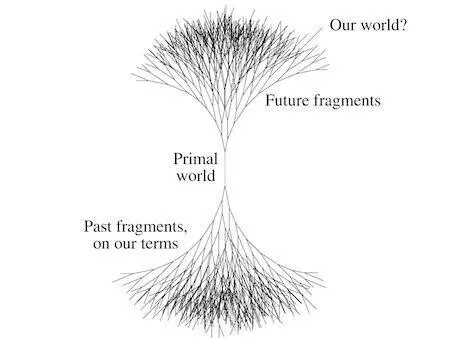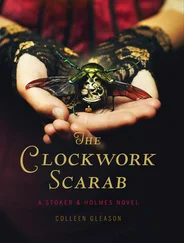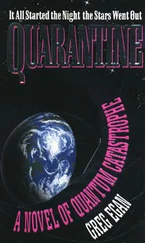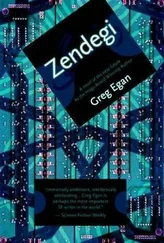Greg Egan - The Clockwork Rocket
Здесь есть возможность читать онлайн «Greg Egan - The Clockwork Rocket» весь текст электронной книги совершенно бесплатно (целиком полную версию без сокращений). В некоторых случаях можно слушать аудио, скачать через торрент в формате fb2 и присутствует краткое содержание. Жанр: Фантастика и фэнтези, на английском языке. Описание произведения, (предисловие) а так же отзывы посетителей доступны на портале библиотеки ЛибКат.
- Название:The Clockwork Rocket
- Автор:
- Жанр:
- Год:неизвестен
- ISBN:нет данных
- Рейтинг книги:3 / 5. Голосов: 1
-
Избранное:Добавить в избранное
- Отзывы:
-
Ваша оценка:
- 60
- 1
- 2
- 3
- 4
- 5
The Clockwork Rocket: краткое содержание, описание и аннотация
Предлагаем к чтению аннотацию, описание, краткое содержание или предисловие (зависит от того, что написал сам автор книги «The Clockwork Rocket»). Если вы не нашли необходимую информацию о книге — напишите в комментариях, мы постараемся отыскать её.
The Clockwork Rocket — читать онлайн бесплатно полную книгу (весь текст) целиком
Ниже представлен текст книги, разбитый по страницам. Система сохранения места последней прочитанной страницы, позволяет с удобством читать онлайн бесплатно книгу «The Clockwork Rocket», без необходимости каждый раз заново искать на чём Вы остановились. Поставьте закладку, и сможете в любой момент перейти на страницу, на которой закончили чтение.
Интервал:
Закладка:
Yalda stroked Tullia’s forehead. “We’ll fix you up,” she promised. “It will be all right.” If Daria could get hold of some melding resin, they could glue together the sides of the furrow and let Tullia’s own body attack the dividing wall. And if Daria sent for her sunstone lamp, the same kind of flash that had set the captive arborine’s muscles twitching could disrupt the signals that were organizing Tullia’s fission. There were so many things they could do. Tullia wasn’t sick, or old, or frail. She wasn’t enslaved to an impatient co. She was a free woman, in the care of her friends.
Having reached the top of her torso, the furrow now began to divide Tullia’s tympanum. Yalda took hold of the edges and squeezed them together with all her strength. “No further,” she said. “And when this hand grows tired, there are ten more waiting.” But in fact there was no great force opposing Yalda’s intervention, just the faintest springiness in the underlying flesh.
Tullia would survive; Yalda was sure of that now. Survive, and flourish. She would enlighten her students and delight her friends for a dozen more years. She would find the light of a forest on a distant world.
The furrow itself wasn’t lengthening, but Yalda could see the walls of hard skin stretching beyond the point where she was pinching them together, growing up toward the place where Tullia’s mouth had been. The slight convexity of her blind eyes had vanished now; the organs had been resorbed and their lids subsumed into the featureless skin around them.
Yalda heard footsteps, then the curtain parted. Daria hurried in, followed by Lidia.
“You promised some boy that I’d pay him four pieces?” Daria asked irritably. “This had better be—”
As Yalda moved aside to let Daria apprehend the reason she’d been summoned, she saw that a cross-furrow was forming now, threatening to divide each of Tullia’s lateral halves. “Did you bring some melding resin?” she asked Daria. “Or should we stitch the gaps together? Clamping with my hands doesn’t work.”
Lidia approached. “There’s nothing we can do,” she told Yalda gently. “Any resin, any drug, any surgery—all that would do now is kill the children.”
Yalda looked to Daria. “That can’t be true.”
Daria said, “Once division starts, it’s irreversible.”
Lidia put a hand on Yalda’s shoulder. “Let her be.”
Yalda turned to her. “What—just let her die?”
“It’s not a choice anymore,” Daria explained sadly. “You can hold her body as tightly as you like, but her brain is already in pieces.”
“Her brain’s destroyed?” Yalda stared down at Tullia’s blank face. “It’s her brain that’s making this happen, isn’t it? Sending out the signals. Don’t tell me it’s in pieces.”
Daria walked up and knelt beside her. “Yalda, she’s gone. She would have been gone long before you found her.”
“No, no, no.” No more lives cut short. Claudia and Aurelia had been far away, out of her hands, but not Tullia.
She turned back to Lidia and pleaded, “What do we do? Tell me!”
Lidia said, “All we can do now is remember her.”
Yalda ran her hand over Tullia’s wounds; the furrow now reached the top of her skull. “There must be something.”
Daria spoke firmly now. “Yalda, this is beyond changing. She was our friend, and we loved her, but her mind is gone; she’s as dead to us now as any man in his grave. Tonight we can only grieve for her.”
Yalda felt herself shivering and humming. She didn’t believe Daria’s words, but some traitorous part of her had decided to behave as if they were true.
“And in the morning,” Daria added, “we’ll need to talk about the way we’re going to raise her children.”
10
As Yalda stood in the courtyard waiting for her guest to arrive, she counted two dozen pale streaks of color drifting in mirrored pairs across the afternoon sky. From their leisurely pace she could tell that these Hurtlers were not especially close—perhaps a little farther than the sun itself—but to be visible by day at such a distance they would have to have blazed far more brightly than the specks that only showed at night.
Brighter almost certainly meant larger .
She spotted Eusebio crossing the courtyard and held up a hand in greeting. “Hello, Councilor.”
“It’s good to see you again, Yalda,” he said.
“You too.”
He glanced up at the sky. “It seems almost normal now, doesn’t it? People can get used to the strangest things.”
“Sometimes that’s a useful trait,” Yalda said.
“But not this time,” Eusebio suggested.
“Maybe not.”
They left the courtyard and strolled across the campus; Yalda had offered to organize a meeting room, but Eusebio had wanted to avoid any suggestion that either of them were acting in an official role. Two old friends were getting together to reminisce, that was all.
“I’ve only heard third-hand versions of your theory about the Hurtlers,” he said. “But they were enough to get me worried.”
“The whole idea’s extremely speculative,” Yalda said. “I wouldn’t go jumping off any bridges yet.”
Eusebio was amused. “Yet? Believe me, that’s not where I’m headed, prematurely or otherwise.”
“But you say you’re worried.”
“Of course I’m worried. Wasn’t that the point? Why else would you raise those possibilities?”
Yalda wasn’t sure how to answer that. The truth was, when she’d first begun discussing the idea with a few colleagues, she hadn’t taken it very seriously. It had been nothing more than an audacious stab in the dark—and far too esoteric, she’d thought, to pose any risk of sowing panic.
Eusebio said, “Maybe there’s something you can clear up for me, to start with. Years ago, you gave a talk where you said the cosmos was a flat, four-dimensional torus. In which case… if you followed a bundle of histories through time, wouldn’t they remain pretty much parallel? And when they met, wouldn’t they just form a loop?” He drew a two-dimensional version, first as a square and then curled up to remove the artificial edges.

Yalda said, “The flat torus is just an idealization—the simplest case where the light equation can be solved nicely. The topology of the cosmos might be more complicated, or the geometry might not be flat. Or maybe the histories of the worlds haven’t stayed together in a nice tight bundle, the way you’ve drawn them; it’s true that everything has to join up in the end, but it doesn’t have to do it tidily . If there was a primal world that fragmented in both directions—one we’d think of as the future, and one we’d think of as the past—and the fragments themselves then broke up, and so on… we could end up colliding with the past fragments at almost any angle.”

Yalda sketched a crude illustration of the idea. “I won’t try to draw this wrapped around a torus, but you can imagine the possibilities if those two sets of fragments ever came to overlap.”
“So the primal world gets to explode both backward and forward?” Eusebio gave a chirp of delight tinged with skepticism.
“I know it sounds strange,” Yalda conceded, “but if the primal world is where entropy reaches its minimum value, it’s just as reasonable for it to explode in one direction as the other. Imagine the cosmos filled with a vast tangle of unruly threads—the histories of all the particles of matter—and then demand that somewhere they’re all packed together and perfectly aligned. I’m not sure why that has to occur at all, but unless there’s some extra rule imposed on top of it, the threads are going to break free in the same way on both sides of the constriction—creating two localized arrows of time pointing in opposite directions.”
Читать дальшеИнтервал:
Закладка:
Похожие книги на «The Clockwork Rocket»
Представляем Вашему вниманию похожие книги на «The Clockwork Rocket» списком для выбора. Мы отобрали схожую по названию и смыслу литературу в надежде предоставить читателям больше вариантов отыскать новые, интересные, ещё непрочитанные произведения.
Обсуждение, отзывы о книге «The Clockwork Rocket» и просто собственные мнения читателей. Оставьте ваши комментарии, напишите, что Вы думаете о произведении, его смысле или главных героях. Укажите что конкретно понравилось, а что нет, и почему Вы так считаете.










